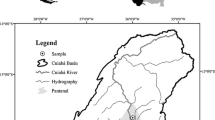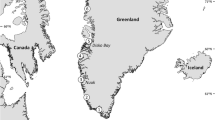Synopsis
Changes in the age/length structure of Lepidogalaxias salamandroides populations in temporary waters of south-western Australia were monitored over a 51 month period by regular field sampling. Each year the study area experienced a summer drought of approximately five months duration. During the drought period Lepidogalaxias burrows into the mud and aestivates and substantial mortality occurs during this period. Body lipid reserves decrease during this period suggesting that they are the main energy source used during aestivation. The amount of lipid remaining after aestivation appears to be important in determining when female fish reproduce. Males die after reproduction and achieve a maximum age of only about 12 months. Some females also reproduce and die at this age while others defer reproduction for another year. Fecundity is much higher in these older, larger fish: they must however, survive two drought periods before they reproduce. The evolution of the life history style shown by Lepidogalaxias salamandroides is discussed with respect to the well defined seasonality of the region and it is suggested that selection for reproduction at an early age is balanced by the constraints of offspring survival during the aestivation period.
Similar content being viewed by others
References cited
Allen, G.R. 1982. A field guide to the inland fishes of Western Australia. Western Australian Museum, Perth. Perth. 92 pp.
Boyce, M.S. 1979. Seasonality and patterns of selection for life histories. Amer. Nat. 114: 569–583.
Bruton, M.N. 1979. The survival of habitat desiccation by air breathing clariid catfishes. Env. Biol. Fish. 4: 273–280.
Bunn, S.E., 1988. Life histories of some benthic invertebrates from streams of the northern jarrah forest, Western Australia. Aust. J. mar. Freshw. Res. 39: 785–804.
Bunn, S.E., D.H. Edward & N.R. Loneragan. 1986. Spatial and temporal variation in the macroinvertebrate fauna of streams of the northern jarrah forest, Western Australia: community structure. Freshw. Biol. 16: 67–91.
Christensen, P. 1982. The distribution of Lepidogalaxias salamandroides and other small freshwater fishes in the lower south-west of Western Australia. J. Roy. Soc. West. Aust. 65: 131–142.
Donnelly, B.G. 1978. Evidence of fish survival during habitat desiccation in Rhodesia. J. Limnol. Soc. south. Afr. 4: 75–76.
Eldon, G.A. 1978. The life history of Neochanna apoda Gunther (Pisces: Galaxiidae). N. Z. Ministry of Agriculture and Fisheries Bulletin 19, 44 pp.
Eldon. G.A. 1979. Breeding, growth and aestivation of the Canterbury mudfish, Neochanna burrowsius (Salmoniformes: Galaxiidae). N. Z. J. mar. Freshw. Res. 13: 331–346.
Fink, W.L. & S.H. Weitzman. 1982. Relationships of the stomiiform fishes (Teleostei) with a description of Diplophos. Bull. Mus. Comp. Zool. 150: 31–93.
Fisher, R.A. 1930. The genetical theory of natural selection. Clarendon, Oxford. 272 pp.
Folch, J., M. Lees & G.H.S. Stanley. 1957. A simple method for the isolation and purification of total lipids from animal tissues. J. Biol. Chem. 226: 497–509.
Gibbons, J.W. 1972. Reproduction, growth and sexual dimorphism in the canebrake rattler (Crotalus horridus atricaudatus). Copeia 1972: 222–226.
McArthur, W.M. & A.L. Clifton. 1975. Forestry and agriculture in relation to soils in the Pemberton area of Western Australia Soils and Land Use Series 54, CSIRO, Perth. 48 pp.
McDowall, R.M. 1969. Relationships of galaxoid fishes with a further discussion fo salmoniform classification. Copeia 1969: 796–824.
McDowall, R.M. & B.J. Pusey. 1983. Lepidogalaxias salamandroides Mees — a redescription, with natural history notes. Rec. West. Aust. Mus. 11: 11–23.
Mees, G.F. 1961. Description of a new fish in the family Galaxiidae from Western Australia. J. Roy. Soc. West. Aust. 44: 33–38.
Parry, G.D. 1981. The meanings of r- and K-selection. Oecologia 48: 260–264.
Pusey, B.J. 1986. The effect of starvation on oxygen consumption and nitrogen excretion in Lepidogalaxias salamandroides. J. Comp. Physiol. B 156: 701–705.
Pusey, B.J. 1989a. Aestivation in the teleost fish Lepidogalaxias salamandroides Mees. J. Comp. Biochem. & Physiol. 92A: 137–138.
Pusey, B.J. 1989b. Gas exchange during aestivation in Lepidogalaxias salamandroides. Fishes of Sahul (in press).
Pusey, B.J. & D.H. Edward. 1989. The structure of fish assemblages in inland waters of south-western Australia. Aust. J. mar. Freshw. Res. (in press).
Pusey, B.J. & T. Stewart. 1989. Internal fertilization in Lepidogalaxias salamandroides Mees (Pisces: Lepidogalaxiidae). J. Linn. Soc. Lond. Zool. (in press).
Rosen, D.E. 1973. Interrelationships of higher euteleostean fishes. pp. 397–513. In: P.H. Greenwood, R.S. Miles & C. Patterson (ed.) Interrelationships of Fishes, Academic Press, London.
Rosen, D.E. 1974. Phylogeny and zoogeography of salmoniform fishes and relationships of Lepidogalaxias salamandroides. Bull. Amer. Mus. Nat. Hist. 153: 263–325.
Schaffer, W. M. 1974. Optimal reproductive effort in fluctuating environments. Amer. Nat. 108: 783–790.
Seddon, G. 1972. Sense of place. University of Western Australia Press, Perth. 354 pp.
Scott, E.O.G. 1966. The genera of the Galaxiidae. Aust. Zool. 13: 244–258.
Southwood, T.R.E. 1977. Habitat, the templet for ecological strategies. J. Anim. Ecol. 46: 337–365.
St. Girons, H. 1957. fr|Le cycle chez Vipera aspis (L.) dou l'ouest de la France. Bull. Biol. de la France et de la Belgique 91: 284–350.
Wharton, C.H. 1966. Reproduction and growth in the cottonmouths, Agkristodon piscivorous Lacépède of Cedar Keys, Florida. Copeia 1966: 149–161.
Wourms, J.P. 1972. The developmental biology of annual fishes. III. Pre-embryonic and embryonic diapause of variable duration in the eggs of the annual fishes. J. Exp. Zool. 182: 389–414.
Zar, J.H. 1974. Biostatistical analysis. Prentice Hall, Englewood Cliffs. 620 pp.
Zaret, T.M. & A.S. Rand. 1971. Competition in tropical stream fishes: support for the competitive exclusion principle. Ecology 52: 336–342.
Author information
Authors and Affiliations
Rights and permissions
About this article
Cite this article
Pusey, B.J. Seasonality, aestivation and the life history of the salamanderfish Lepidogalaxias salamandroides (Pisces: Lepidogalaxiidae). Environ Biol Fish 29, 15–26 (1990). https://doi.org/10.1007/BF00000564
Received:
Accepted:
Issue Date:
DOI: https://doi.org/10.1007/BF00000564




